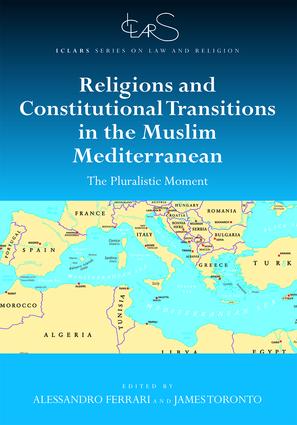Religions and Constitutional Transitions in the Muslim Mediterranean

Religions and Constitutional Transitions in the Muslim Mediterranean edited by Alessandro Ferrari and Center Senior fellow, James Toronto has been published as part of the Routledge ICLARS Series on Law and Religion. The volume grew out of the Center co-sponsored conference Religions & Constitutional Transitions, Muslim Mediterranean: “The Pluralistic Moment” held in Como, Itlay in June 2014.
This book investigates the role of Islam and religious freedom in the constitutional transitions of six North African and Middle Eastern countries, namely Morocco, Algeria, Tunisia, Egypt, Turkey, and Palestine. In particular, the book, with an interdisciplinary approach, investigates the role of Islam as a political, institutional and societal force. Issues covered include: the role played by Islam as a constitutional reference – a “static force” – able to strengthen and legitimize the entire constitutional order; Islam as a political reference used by some political parties in their struggle to acquire political power; and Islam as a specific religion that, like other religions in the area, embodies diverse perspectives on the nature and role of religious freedom in society. The volume provides insight about the political dimension of Islam, as used by political forces, as well as the religious dimension of Islam. This provides a new and wider perspective able to take into account the increasing social pluralism of the South-Mediterranean region. By analyzing three different topics – Islam and constitutionalism, religious political parties, and religious freedom – the book offers a dynamic picture of the role played by Islam and religious freedom in the process of state-building in a globalized age in which human rights and pluralism are crucial dimensions.
Reviews
In times of stereotyping Islam and its political ambitions, this is a more than timely volume. The thorough studies presented by renowned scholars shed light on the complex interplay between religion, its role in society and politics, and the vast range of varieties in regulating the relationship between state law and religion. An outstanding scientific work!
— Professor Mathias Rohe, University of Erlangen-Nuremberg, Germany
At a moment when discussions of Islam and politics are often driven by fear and misunderstanding, Ferrari and Toronto offer a compelling alternative in this study of the entangled histories of religion, law, and state on the northern and southern shores of the Mediterranean. This book charts a new and ambitious path for the comparative study of religion and constitutional law in Europe and the Middle East.
— Professor Elizabeth Shakman Hurd, Northwestern University, USA